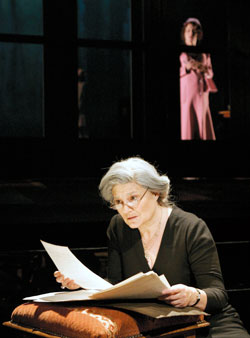For a good while, you’ll swear you won’t survive the trek through Craig Lucas’ Singing Forest (Intiman Theatre, 206-269-1900; ends Sat., Aug. 21) without a compass and the patience of Job. It’s a wrenching, unwieldy, highfalutin farce, a door-slamming contemplation of everything from the Nazis to 21st-century urban alienation, filled with flashbacks and featuring characters all pretending to be somebody else (and all played by actors cast in double roles). Lucas’ ambitions are so many that it’s sometimes hard to see his Forest for the trees. But damned if you don’t come out on the other side convinced it was worth the journey.
To digest even the setup requires considerable fortitude. It’s 2000, and Holocaust survivor Loë Rieman (Anne Scurria) is a formidable former psychoanalyst—a patient/protégé of Sigmund Freud (Laurence Ballard, also terrific playing Loë’s alcoholic comrade Bill)—living in seclusion on Staten Island. She was drummed out of the profession by son Oliver (David Garrison), a gay psychoanalyst who is bitter about a childhood during which he and his twin sister, Bertha (Jeanne Paulsen), suffered the ravages of Loë’s post-traumatic stress. Oliver is presently directing his bile at patient and fellow therapist Shar Unger (John Procaccino), who doesn’t know that hunky ex–boy toy Laszlo (Malte Frid-Nielsen) is now dating Oliver. Oliver decides to get Shar drummed out of the profession, too, by encouraging him to sleep with his patient, Gray (Daniel Eric Gold), a malleable young actor who has confessed sexual feelings to Shar. Unbeknownst to everybody, Gray is actually straight and only posing as a sort of surrogate patient for the publicity-shy Jules Ahmad (Jay Goede), Bertha’s famously estranged gay zillionaire son; Jules is living in seclusion and is bitter over a childhood during which he suffered the ravages of his mother’s post-traumatic stress (which included her rather notoriously setting his father on fire).
Still with me? Good, because Loë is also electronically disguising her voice and posing as a phone sex operator, a ruse that coincidentally seduces both a frazzled Shar and an increasingly overwhelmed Gray, who’s just learned that his perpetually disappointed girlfriend, Beth (Kristin Flanders), is pregnant. More? Loë’s long-buried heartbreak occasionally takes us back to Vienna in the 1930s, when she and her family confronted a farce of a far darker hue.
Tracking Lucas’ strained perambulations through amped-up Woody Allen angst won’t be your only chore. The show is somewhat miscast. Neither Garrison nor Procaccino would seem believable cruising Frid-Nielsen (a studly Laszlo, also chilling as Loë’s Nazi tormentor), and they’re both playing gay in a faintly dated way that suggests saucy ’70s dinner theater. Procaccino, in particular, has corralled all of his vaguely Alan Alda–ish tics and pinched them into sensitive poofery. Flanders’ mannered affectations make sense in her second role as the headstrong young Loë, but she’s far too grand for Gray’s girlfriend, Beth, the pained Starbucks employee who finds inspiration in Loë’s diaries. She dwarfs Gold, a little slip of a thing who is giving one of the production’s smartest performances but doesn’t seem a likely doppelgänger for Goede, whose Jules is as ill-defined as his role.
Yet, time and time again, Bartlett Sher’s production pulls itself back from the brink of disaster. The emotional tenor of the piece effectively turns on a dime round about the time Loë and Gray share a touching embrace over the phone line, and Lucas’ insistent shifts from comedy to tragedy build in resonance as the evening moves forward—he’s exploring both a modern malaise and a more timeless melancholia, and he’s tapped into how deeply important it is for us to reveal ourselves to one another. These people would rather be anybody but themselves, and when Beth says, “I have everything it takes to make a happy life, but I can’t locate it,” it sounds awfully universal. Graceful transitions from New York to Vienna and back again show Sher at his best; the flashback that closes Act Two is a stage picture as impeccably developed as anything you’ll encounter this season.
And then there is Scurria, so deftly, devastatingly good that you read her program bio and bemoan not witnessing the other commanding women on her East Coast résumé (Hannah in Angels in America, Vivian in Wit, Martha in Virginia Woolf . . . ). Loë isn’t an easy character; she has to be both brittle and approachable at once. Scurria nails the role through your forehead, then convinces you she’s done it with a gentle hand. Her Loë is the reason you tolerate the rest of the play’s lost souls—a mother presiding over children both actual and metaphorical, all compelled into hiding by secrets they’re certain are too shameful to share.








